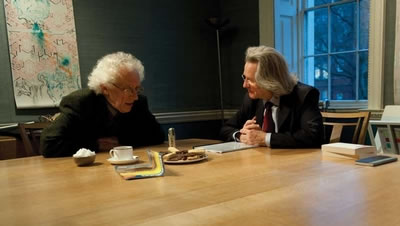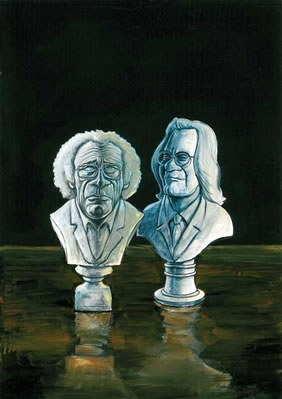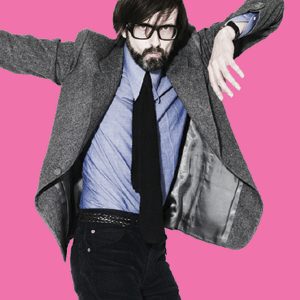"We are all children of the Enlightenment… at the same time the ills fought by the spirit of the Enlightenment turned out to be more resistant that eighteenth-century theorists thought. They have grown even more numerous. The traditional adversaries of the Enlightenment – obscurantism, arbitrary authority and fanaticism – are like the heads of the Hydra that keep growing back as they are cut. There is reason to fear that these attacks will never cease. It is therefore all the more necessary to keep the spirit of the Enlightenment alive. The age of maturity that past authors were hoping would come seems not to be the destiny of humankind: humanity is condemned to seek truth rather than possess it. Asked if we were already living ‘in an enlightened age’, Kant wrote, ‘the answer is No, but we do live in an age of enlightenment.’ This would be the vocation of our species: to pick up the task of enlightenment with each new day, knowing that it is interminable."
Extract from Tzvetan Todorov, In Defence of the Enlightenment (Atlantic, pp 149-151)
 The conversation between AC Grayling and Tzvetan Todorov took place at the Art Workers' Guild, Queen Square, London on 7 December 2009. Photography by Des Willie. If you'd like to read a longer version, we've also published the full unedited transcript.
The conversation between AC Grayling and Tzvetan Todorov took place at the Art Workers' Guild, Queen Square, London on 7 December 2009. Photography by Des Willie. If you'd like to read a longer version, we've also published the full unedited transcript.
AC GRAYLING: Your new book In Defence of the Enlightenment argues that the wisdom of the Enlightenment thinkers is as relevant today as it was in the 18th century. This involves you in a reconsideration of some of those thinkers. Perhaps we might start with Rousseau’s role in Enlightenment thought. A very complex figure.
TZVETAN TODOROV: Yes, he is complex. He has never been entirely in line with the mainstream encyclopaedists and philosophes, because his first major writing, the First Discourse on Arts and Sciences, was opposed to the ideas of the Enlightenment. The Enlightenment claimed that the promotion of high culture, the theatre and reading and the arts, would automatically lead to a social progress. Rousseau chose to defend the opposite thesis, arguing that there was a degradation of human society because of the arts and sciences. On the surface that’s a totally anti-Enlightenment argument. But in his mature political writings, The Second Discourse, the Social Contract and Emile, he did develop a vision of human society and of human beings which are among the deepest interpretations of Enlightenment ideas. Here you will find a recognition of the role of free will and deliberate action as the major characteristic of the human species. There are the famous pages in the Second Discourse, the “Discourse on the Origin of Inequality”, in which Rousseau contrasts different animal species and says, put a pigeon in front of a piece of meat and put a fox in front of vegetables and they will die of hunger. But human beings are able to abandon whatever they receive as education and adapt to new circumstances. Rousseau does not define human beings as rational but as beings that are capable of creating their own code of behaviour, and this is what we call culture. And this is why different human communities have different cultures. This insistence on the major central role of human autonomy, of the capacity to act out of decision of the will, is a major contribution.
Of course it’s true that he had a huge Romantic following, all the trivial celebrity autobiographies and the emphasis upon problems of the self were born out of Rousseau’s Confessions and Reveries. However, he never imagined human beings as self-sufficient individuals. He was acutely aware of the social nature of human beings, and this is a dividing line between humanism and individualism. Individualism being the image of the individual as a self-sufficient, independent being: “well, I communicate with others, but that’s just because I can do it. But if only I could achieve my authentic self, then I wouldn’t need any communication with anyone outside of me.” I quote contemporary writers like Bataille and Blanchot, and also Sade at the time of Rousseau, who perpetuate this myth. But Rousseau did not. He says in the Second Discourse, before we became social beings, we were not fully human. The full humanity comes with the socialising process. However, he himself hated being with other people, and was so eloquent in this that what his immediate successors imitated was precisely this exclusion of the outside world, self-absorption. In that way all these endless autobiographies of insignificant people that we read today are very, very distant heirs of Rousseau.
ACG: Let me turn to other Enlightenment figures, to Hume and Kant. We think of the Enlightenment as privileging reason, but for Hume and Kant the question was: what are the limits of reason? Hume was sceptical about the capacity of reason to solve our problems in metaphysics and elsewhere. And so indeed was Kant. People ask, if they are Enlightenment thinkers, why are they looking for the limits of reason?
TT: I think it was a kind of wisdom of Enlightenment thinkers that they perceived reason within its limits. But there are two dangerous caricatures of this position. One is to say that reason is only desiccating, and too dry and doesn’t understand anything, and we should put feeling first. And the other, which is no less dangerous, is to eliminate all non-discursive expression of knowledge, to eliminate the place for arts, for myth, for different kinds of knowledge of the world. We have to be careful about both dangers, both reductions. And this is what I try to remind the reader: the Enlightenment was a complex moment when people fought so that reason would replace traditional authority.
ACG: And one example of such reduction is scientism, the idea that science can solve all our problems, or explain human nature, or tell us what is morally good.
TT: Yes, one thing that is characteristic of the Enlightenment, among the encyclopaedists in France in particular, was that they wanted to apply the scientific mindset to understanding society, morality, the social order and politics. But they didn’t mean that science itself was going to solve problems in these fields. When you think scientifically, you think in an open-minded way, in which questions of practicality, empirical test of hypotheses, and public debate are central. This contrasts sharply – because of its open-endedness, its preparedness to live with uncertainty, and with the creation of new problems from the solution of old problems – with the old narrative structure of theistic explanations of the world. Those narratives are very neat. We can tell the religious story in ten minutes, but to explain science takes years.
To bring the scientific mindset to social problems means having to collect the facts, to examine and think about them, to discuss and debate them. So it seems to me that that is characteristic of Diderot, d’Alembert and to a great extent Voltaire himself, who was scientifically very literate. This is not scientism, it’s not scientific as such, but it has something of the quality of the scientific mindset, which I see as being quite fundamental to the Enlightenment.
 ACG
ACG
TT: But your objection concerns all religions and not Christianity specifically. The word “Islam” means “submission”, and each and every religion implies total submission to authority, otherwise it’s no longer religion, it’s New Age or something similar. Nevertheless, I think that we can distinguish between religions which appeal to all human beings, or to our tribe only. And this is a significant difference. It doesn’t make Christianity equivalent to the human rights struggle. However, the very idea that all human beings can follow the same path, and not just those who belong to our tribe, is I think a significant difference. And this is a Christian heritage in a way. Concerning love, St Paul has in fact quite striking statements. On several occasions in his Epistles, in which he says you have only two obligations as Christians: love God, and love thy neighbour. And he adds, if you really love thy neighbour, then you have performed the first requirement of loving God. Which means that you don’t have to love God separately outside the simple attitude towards other human beings.
This was not the way Christianity was interpreted later, of course. Through the ages it was said that the love for the creature should not hinder the love for the creator and thus there was a hierarchy. And Pascal wrote that he wanted to not love people too much, because this made it impossible for him to love only God. However, not every Christian thinker followed that line. In the 18th century people like Gotthold Lessing and Benjamin Franklin said Christianity teaches us love. So we keep the love, we keep the closest addressees, we keep the essentials. We just eliminate the distant addressee, God. This allowed them to avoid a frontal clash with the religious authorities of their time. As you remember, Paul also says, if you don’t have faith, it doesn’t matter, if you don’t have hope, it doesn’t matter, but you have to have love. Of course, others were concerned with who is Christian and who is not, and then determined to kill those who weren’t. They weren’t that universalist.
ACG: I was very struck by something you say in your book, that there is one science and there are many religions. The idea of the objectivity that scientific inquiry yearns towards contrasts with the fact that different belief systems, and their tribalism, are the things that divide people. To maximise agreement, to find common ground, is also an aspiration to a universal ethics, implicit in the idea of human rights, protection of which opens a space for individuals to create the good. You say in your book that you’re sceptical about human rights as a possible basis for a universal morality.
TT: Well, let me first agree on the first point, which is the real universality of science. If we had doubts about the possibility of finding universal consensus on anything, we have a good counter-example here. People don’t go out and try to invent another form of electric current.
I’m not against human rights. Who could be against human rights? But I’m a little sceptical about their use. It seems to be that the preliminary of human rights is indeed something that we should cherish very much, which is the capacity of finding a common ground. I observe, however, and I think that’s why I have this sceptical view, that human rights nowadays are used as a kind of instrument for justifying our Western superiority. And as soon as we observe that somewhere rights are not exactly accepted in the same way, we consider these countries definitely inferior and maybe even deserving punishment.
I think that we in the West are very proud of our traditions and justly so, but we still have a lot to learn from the Chinese traditions, from the African traditions, from all sorts of ways of being elsewhere. We need to pay attention to these rather than extracting one savage habit such as clitoridectomy, and say, “Well, how can you do that?”
ACG: But even when we’re being careful not to impose our cultural norms, when we’re arguing that all human beings have certain fundamental needs and interests that we can recognise, even then we get accused of cultural imperialism. When can we act? For example, what would you do if Nicolas Sarkozy said, okay, you’re in charge now, and here is the problem of Darfur, or Rwanda. What then?
TT: There is a real danger that the intervention of Western powers will aggravate the problem instead of solving it.
ACG: But is that a practical point or a philosophical point?
TT: It’s practical. I think that the intervention of local forces has a much bigger chance of helping to solve the problems you mention. And there are differences in the degree to which human rights are transgressed. This needs to be considered when justifying interventions. Even in the case of genocide, where intervention is necessary to prevent millions of people getting killed, even in this case, clearly the local neighbour is much more efficient, is much more concerned.
I think frequently the means that we use in order to impose our values are counter-productive. I think the means that have been most productive are the diffusion of the ideas of the Enlightenment. And these have really changed the world. Decolonisation was fuelled by ideas of autonomy, equal dignity, individual freedom, which were ideas of the Enlightenment.
ACG: Yes, agreed. If you look at a Western liberal democracy, one thing you notice is that within it there is a great deal of argument, disagreement, discussion, tumult, upset. This is a sign of health, not of dysfunction. Peace is what tyrannies produce. Argument and discussion are signs of health, because a society constantly negotiating with itself always has possibilities. It’s a valuable lesson, this, and of course it’s a lesson very much of the Enlightenment. Because one thing that’s characteristic about the Enlightenment is the celebration of plurality, of difference, of the idea that debate is healthy and productive. What Stalinism has in common with the Catholicism of Torquemada is what I call a monolithic ideology, an ideocracy, serving the One Great Truth at individual expense.
TT: Indeed. And so we might conclude our discussion by agreeing that by criticising the Enlightenment we are remaining faithful to its principles.
In need of more? We have also published a full unedited transcript of this conversation
Letters to the editor: send us your thoughts for our letter pages by email to editor@newhumanist.org.uk

